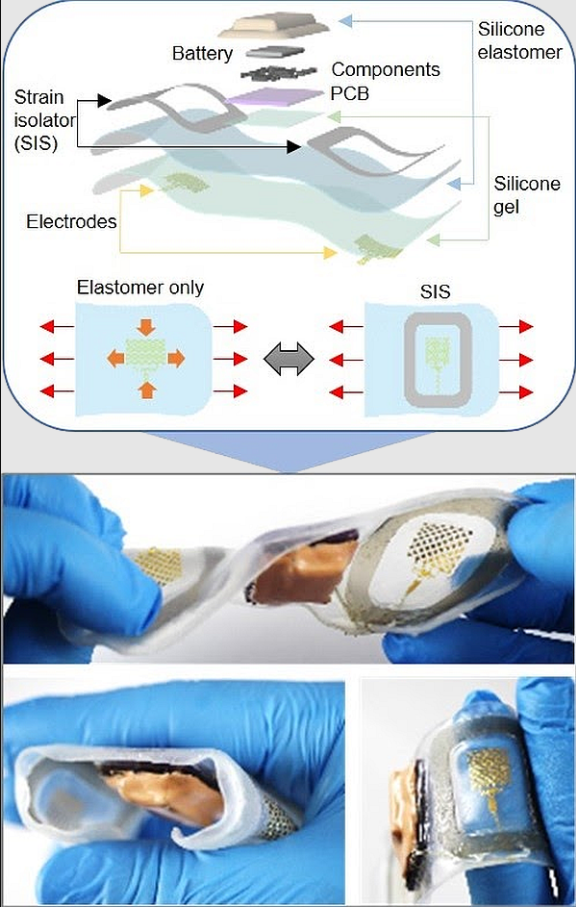This wireless wearable bioelectronic device collects a variety of physiological data that enables patients and their health care providers to monitor critical cardiac indicators. Data collected include high-quality electrocardiogram (ECG), heart rate, respiratory rate, and physical activity classification. The innovation is particularly notable as it filters out everyday motions that can alter ECG data; these so-called motion artifacts (MAs) can make it difficult for clinicians to detect abnormal heart rhythms.
Unlike conventional sensors and systems that operate with aggressive adhesives or straps—and often lose valuable data due to significant MA interference—Georgia Tech’s chest-mounted innovation adheres to the skin with a breathable soft membrane for continuous conformal contact. In testing against commercially available skin-mounted biosensors, the new device provided real-time wireless data of multiple physiological signals with a significant reduction in MA interference. Additionally, trial participants experienced few or none of the challenges typical of conventional health monitoring devices, including device lamination issues, signal degradation, excessive sweating, or skin irritation.
- High performance: Captures real-time, real-world data of multiple physiological signals with a significant reduction in MA interference
- Chest-mounted: Provides more accurate ECG, heart rate, respiratory rate, and activity detection than existing wrist-worn commercial monitors
- Comfortable: Adheres securely and discretely to the skin using a breathable soft membrane for continuous conformal contact, eliminating excessive sweating and skin irritation
- Reliable: Eliminates device lamination and signal degradation
This wireless bioelectronic device measures multiple health-related data points in real time and is useful for:
- Patients and athletes to evaluate daily health conditions
- Health care providers to monitor and analyze a patient’s physiological state
Cardiovascular diseases affect a large percentage of the adult U.S. population and continue to be a leading cause of death worldwide. Portable, long-term continuous monitoring of ECG data would be helpful in detecting the onset of heart arrhythmias that can happen during daily activities. Recent developments of micro-sensors and flexible electronics allow for the manufacturing of chest-mounted health monitoring devices, including ECG detection systems. However, many lose valuable data due to significant MA events.
Georgia Tech’s fully integrated wireless device monitors multiple physiological signals while restricting MA interference during multi-hour, real-life activities. The system adheres to the skin using a breathable soft membrane for continuous conformal contact. A pair of nanomembrane mesh electrodes and a thin-film circuit powered by rechargeable lithium-ion batteries are placed on a thin layer of silicone gel to allow a greater range of motion. These components are packaged within a low modulus silicone elastomer.

Schematic view of the multi-layered device, including skin-contact electrodes, soft substrates, strain isolators, chip components, and encapsulants (above) and a series of images representing the device’s flexibility and small form factor (below)
